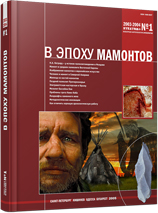Некоторые методологические проблемы первобытной археологии и основные обобщающие понятия: «археологическая эпоха», «археологическая культура», «технокомплекс», «историко-культурная область»
Some Methodological Problems of Primitive Archaeology and Basic Generalizing Concepts: «Archaeological Stage», «Archaeological Culture», «Technical Complex», «Cultural-Historical Region»
Author(s): Mikhail V. AnikovichSubject(s): History, Archaeology
Published by: Издательский дом Stratum, Университет «Высшая антропологическая школа»
Summary/Abstract: Regarding archaeology within the system of historical cognition allows determining it as an independent discipline which studies records, with all its specific goals and objectives. The principle of actuality stands out in the foreground of archaeology: only that which is inherent part of the present is reconstructed from the past, which implies that one cannot solve archaeological problems within the framework of „purely archaeological” concepts and methods, without referring to the language accepted in social and historical disciplines. Such integrating concepts are necessary that have no status of „purely archaeological” but are widely implemented in archaeological practice. Particularly, the most important for the Upper Palaeolithic are three such concepts: archaeological culture, technical complex, cultural-historical area. The archaeological culture can be understood as a system of traditions developed in certain social groups under certain historical conditions, which found its material expression in such results of human activity that could become archaeological records, and which is revealed through analysis of these records. The technical complex is understood as a relatively steady system of technological approaches, generating similar features in inventory, which emerge and function in wide geographical and temporal limits in various cultural and historical forms, not connected by genetic relation. A cultural-historical region reflects a totality of archaeological cultures and sites, whose cultural belonging is either not determined or debatable, but which existed within rather clear territorial boundaries during a certain time interval that was shorter than an archaeological stage. In this definition of the cultural-historical region it is necessary to emphasize that it must have some features of cultural similarity, which either do not coincide or coincide but partially with features of archaeological cultures of a given territory, but which distinguish this cultural-historical region from others found on adjacent territories.
Journal: Stratum plus. Археология и культурная антропология
- Issue Year: 2004
- Issue No: 1
- Page Range: 487-506
- Page Count: 20
- Language: Russian
- Content File-PDF

